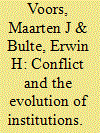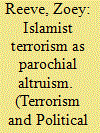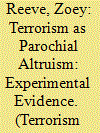|
|
|
Sort Order |
|
|
|
Items / Page
|
|
|
|
|
|
|
| Srl | Item |
| 1 |
ID:
133702


|
|
|
|
|
| Publication |
2014.
|
| Summary/Abstract |
The impact of armed conflict may persist long after the end of war, and may include a lasting institutional legacy. We use a novel dataset from rural Burundi to examine the impact of local exposure to conflict on institutional quality, and try to 'unbundle' institutions by distinguishing between three dimensions of the institutional framework: property rights security, local political institutions, and social capital. We find that conflict exposure affects institutional quality, and document that the impact of conflict on institutional quality may be positive or negative, depending on the institutional measure. Specifically, exposure to violence strengthens in-group social capital and promotes tenure security. However, the appreciation for state institutions is negatively affected by exposure to violence. We find no evidence consistent with design-based theories of institutional quality, or the idea that institutional quality is enhanced by interventions of (non)state external actors. Instead our findings provide some support for the theory of parochial altruism. Our results emphasize the importance for policymakers to consider autonomous responses to conflict when designing development programs. They further imply some caution for actors seeking to reform local institutions through top-down interventions.
|
|
|
|
|
|
|
|
|
|
|
|
|
|
|
|
| 2 |
ID:
172169


|
|
|
|
|
| Summary/Abstract |
An evolutionary approach is used to explain how certain universal cognitive mechanisms (parochial altruism) underlie engagement and involvement in Islamist terrorism. Parochial altruism is the tendency to perceive and behave in ways that favour ingroups and disfavour outgroups in light of particular intergroup cues, whilst incurring some kind of personal cost to effect that bias. The parochial altruism mechanism influences how ingroups and outgroups are perceived (i.e., as threatened or threatening) and responded to. Experience of certain situations and/or dispositions (i.e., priming contexts of disease, and harm to the ingroup) make parochial altruistic responses more likely. It is argued that Islamist terrorist grievances can be considered as perceptions of evolutionarily relevant threats, whilst terrorism itself is an example of parochial altruistic behaviour. It is further proposed that features associated with engagement in terrorism (including exposure to ideology, propaganda, socialisation, etc.) enhance and guide parochial altruism, that is, perceptions of intergroup threat, and violent responses to it.
|
|
|
|
|
|
|
|
|
|
|
|
|
|
|
|
| 3 |
ID:
183028


|
|
|
|
|
| Summary/Abstract |
Drawing on the evolutionary approach, this paper proposes that certain universal cognitive mechanisms (parochial altruism) underlie engagement and involvement in terrorism. Parochial altruism is the tendency to perceive and behave in ways that favour ingroups and disfavour outgroups in light of particular intergroup cues, whilst incurring some kind of personal cost in order to effect that bias. New data is generated by implementing an experiment and using a student sample to investigate certain features of parochial altruism. Findings indicate that sensitivity to parochial altruism varies across individuals, according to sex, group size, and feelings of vulnerability. Some individuals are more sensitive to perceiving and responding to threatening outgroups, which is relevant to the radicalisation process. It is proposed that in certain conditions, such as the presence of radicalisation risk factors, those most sensitive to parochial altruism may be more open to perceptions of threat to the ingroup, extremist ideology, and more likely to engage in violent actions than others.
|
|
|
|
|
|
|
|
|
|
|
|
|
|
|
|
|
|
|
|
|